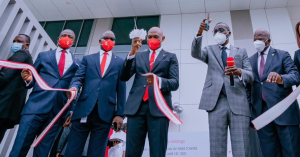April 9, 2014

Secretary-General Ban Ki Moon, Ambassador Ashe, President of the UN General Assembly; Hon. Sajdik, President of ECOSOC; ambassadors, representatives, delegates and observers of the various nations and peoples of the world; representatives of civil society organisations and the private sector; and distinguished ladies and gentlemen.
I thank you for the opportunity to address this distinguished body that is symbol of our common humanity. Coming from Africa, the continent most in need of development, I am particularly grateful to be able to speak on the collective targets that will have a life-changing impact for hundreds of millions of my people. As an entrepreneur – one born, raised, educated, and worked all his life in Africa – now engaged substantially in nurturing more entrepreneurs in Africa, I would like to make a case for the prioritisation of three important issues that affect our continent, in the implementation of the post-2015 development agenda.
These issues are the tackling of unemployment and stimulating job creation; increasing access to electricity; and engaging the private sector as key stakeholders in achieving the 2030 development goals.
In 2000, the United Nations made the historic announcement of eight Millennium Development Goals (MDGs). They were very specific, and a time frame of fifteen years was set to deliver on the goals. Most importantly, they were universal goals, though some of the issues the UN sought to address were unique to certain regions of the world. The ultimate value of the MDGs was that they mandated a global response to the most pressing humanitarian issues affecting a significant number of the world’s population.
The MDGs became an acknowledgement that we are our neighbours’ keepers. Since then, we have made significant progress on these issues, as you all know well. But there are still important lessons to learn from the formulation and implementation of the MDGs.
First, the formulation process was not very inclusive, that is, the goals were mainly focused on the most basic needs of the individual, and less on macro-economic development. Also, they were implicitly designed to be government and donor driven and lacked an explicit commitment to engage private-sector actors as financiers, stakeholders and implementers of the MDGs, to drive sustainability.
This is not to say that the private sector was totally absent from the implementation of the MDGs. There are several examples of successful public-private sector collaboration relating to the MDGs. These partnerships were the most effective when it involved businesses contributing through their own operations, rather than afterwards through CSR programmes funded by profits already earned.
I am talking about examples like the creation of the Global Alliance for Vaccines and Immunization (GAVI), which issues “Vaccine Bonds” to investors all over the world, to fund immunisation in developing countries. I am talking about companies like Vodafone working with GAVI in Africa to record births and vaccinations, reminding parents to bring their children for immunisation, and managing vaccine stocks. I am talking about examples like the Global Fund leveraging Coca-Cola’s expansive global beverage distribution system and core business expertise to build a more efficient supply chain to take drugs to the “Last Mile,” thereby increasing the availability of critical medicines to 75 per cent for Tanzanians and benefitting nearly twenty million people. I am also talking about the Extractives Industry Transparency Initiative, where governments and the private sector in resource-rich countries commit to transparency of payments to facilitate accountability in the natural resources sector.
There are countless other such partnerships out there. Now when it comes to the post-2015 development agenda, I am pleased to observe that the process has been much more inclusive. A High-Level Panel on the Post 2015 Development Agenda was appointed from both donor and recipient countries, and transparent and wide-ranging consultations have been held across the globe, at government, civil-society, private sector and grassroots levels. Importantly, the High-Level Panel’s report on the importance of “Transforming Economies, and an Agenda for Jobs and Inclusive Growth” demonstrates an understanding that both life and livelihoods should be addressed as we set sail for 2030. And it is this reprioritisation that excites me the most.
No one here questions whether development is desirable. No one will challenge the essential human need to save as many lives as we can. But what we can question is whether we can achieve the development imperative with a disproportionate focus on humanitarian assistance and micro-economic issues. We should also question how much of our post-2015 development agenda we could achieve if we maintain a heavy focus on governments as agents of development interventions and do not increase the level of engagement with the private sector in achieving our goals.
I was delighted that the High-Level Panel raised the issue of jobs and inclusive growth as priorities for the next MDGS, because the countries with the largest percentage of poor, the sick, and the oppressed are also the countries with the smallest economies and smallest percentage of formal employed people.
We cannot continue to close our eyes to the looming crisis of unemployment in the African continent. With nearly two hundred million people aged 15–24, Africa has the youngest and most rapidly growing population in the world. By 2045, our youth population will double, and exceed that of China and India. We must create thirteen million jobs each year in sub-Saharan Africa just to keep pace with population growth. By 2020, Africa will need one hundred and twelve million jobs if we are to succeed in the fight against poverty and maintain political stability and global security.
As an entrepreneur with diverse experiences in Africa, I see humanitarian aid and economic opportunity as two sides of the same development coin. The current development practice is to invest in the basic health and education of people, in the hopes that they will eventually make something of themselves. However, I also think that if we help people make something of themselves by investing in jobs and economic opportunity, with the multiplier
effect of access to energy, the beneficiaries will purchase healthcare, purchase education for their children and look after their families.
They will live longer, healthier and in dignity. So we must not focus on one side of the coin at the expense of the other. Citizens with the opportunity to be productive wage earners for their societies also become taxpayers and contribute to government coffers.
Lack of access to energy or electricity is another challenge that will prevent us from eradicating poverty. Nearly five hundred and eighty-nine million, or seven out of ten Africans, have no access to electricity. Only 2 per cent of South Sudanese and Burundians, and 3 percent of Liberians, have access to electricity. Millions of mothers are giving birth in the dark, at great risk to themselves and their babies; millions more are walking further and further every day to gather dwindling resources of firewood; lifesaving vaccine deliveries are challenged by lack of power to support their cold chains; nearly two million deaths per year are associated from illnesses derived from cooking with wood and charcoal. In African Business Enterprise surveys, fifty percent of businesses cited lack of electricity as the major constraint to their growth.
Education is another catalytic sector to achieve development gains, yet ninety million children go to school without electricity. This translates to at least ninety million lost hours of study and homework every day. Over time this lack of electricity and lack of education will create a cumulatively devastating problem for a continent with a large young population without the necessary education and skills to power the continent’s industries. It will also affect the continent’s emergence as a full player in an integrated global economy.
If we agree that access to electricity and improved livelihoods are vital components for the success of the post-2015 development agenda, then the private sector will have a key role to play in the implementation of the post-2015 development agenda. A global agenda that intends to address the livelihood of people and eradicate extreme poverty is not set up for success if it does not engage the sector that controls the most capital, employs the most people, and fosters the most innovation.
Distinguished ladies and gentlemen, understandably, there are concerns about the involvement of the private sector in the post-2015 Development Agenda. Indeed, some appear legitimate. The first concern is that private sector financing will displace government Overseas Development Assistance (ODA). Let me say that private sector financing is not intended and cannot displace ODA. Government investment in development helps to stimulate and incentivise private sector financing, and we have seen this work successfully in multilateral investments in the fights against the global AIDS
pandemic and the Power Africa Initiative, which have attracted the private sector to invest billions in those areas.
But we must also recognise that both donor and recipient governments have limited capacity to invest further, and in the current global economic climate, many are making cuts to their aid and public spending. Thus, in our public capital constrained environment, serious consideration must be given to leverage private capital to meet development needs outside of the most urgent humanitarian situations.
Another concern is that private sector values and interests are different and cannot be aligned with values that drive the development sector. Sadly, not all private sector actors have operated ethically, and it is unreasonable to assume that the market can solve all problems. The world witnessed with bitterness, the upending of the US housing and banking bubbles, which set off a devastating seismic chain of devastating national economic meltdowns, in multiple countries. And that is why the creation of the UN Global Compact to elevate human and labour rights and establish anti-corruption and environmental sustainability in corporate practices, is an important milestone in the area of corporate accountability.
However, it would also be wrong to assume that all businesses are driven by the principle of pure profit, devoid of values. I am the Chairman of Heirs Holdings, an African investment company, which operates in strategic sectors of industry all over Africa, including banking, power, oil & gas, agribusiness, real estate and hospitality and healthcare. We are driven entirely by the values and philosophy of Africapitalism, a term I coined to define the new role of the private sector in the development of Africa, through long-term investments that create economic prosperity and social wealth. Heirs Holdings may be best known for our $2.5 billion, 2,000MW commitment to Power Africa – a commitment we have started delivering through our Transcorp Ughelli power plant.
We made the investment with the intent of returning a profit, while also creating significant social impact. Through this, we are helping to create thousands of direct and indirect jobs in the economy. We also know that it means more electricity for homes, hospitals, and more homework at night. It also means a huge boost for small businesses and entrepreneurs, which further leads to increased economic growth and job creation. Ours is one of many examples of companies around the world seeking a more inclusive approach to growth.
A successful UN post–2015 commitment to create jobs and increase access to electricity will require governments, donors and multilaterals to invest in human capital, through formal education and vocational skills training to drive employability. It will require enacting reforms and new policies to create more competitive business environments. This will not only unleash the growth
of small and medium-size enterprises, it will also attract and incentivise multi-billion dollar investors, to fill the infrastructure gap in underdeveloped regions.
However, we in the private sector have important reforms to make as well. We must evolve our business theories of success and Corporate Social Responsibility (CSR). No longer can CSR be considered just small corporate donations to good causes in their communities of operations. Launch CSR 2.0 and apply the principles of Africapitalism, which means that the intent to “create and multiply value” in the societies in which we source, supply and operate, must be built into our corporate governance, our operations, our project development and our profits, across the value chain. We must no longer wait for governments or the courts to compel us to do the right thing. We can do the right thing, while simultaneously doing well for our shareholders.
Finally, in the pursuit of a sustainable post-2015 development agenda, we must harness the best of political will and resources, incentivise and convene power of the governmental sector, combining it with the compassion, selflessness and dedication of the non-profit sector, the innovation, expertise and financial capital of the private sector; and the drive, creativity and entrepreneurial spirit of the very people we seek to help. This is how we will transform the world we live in and truly make poverty history.



